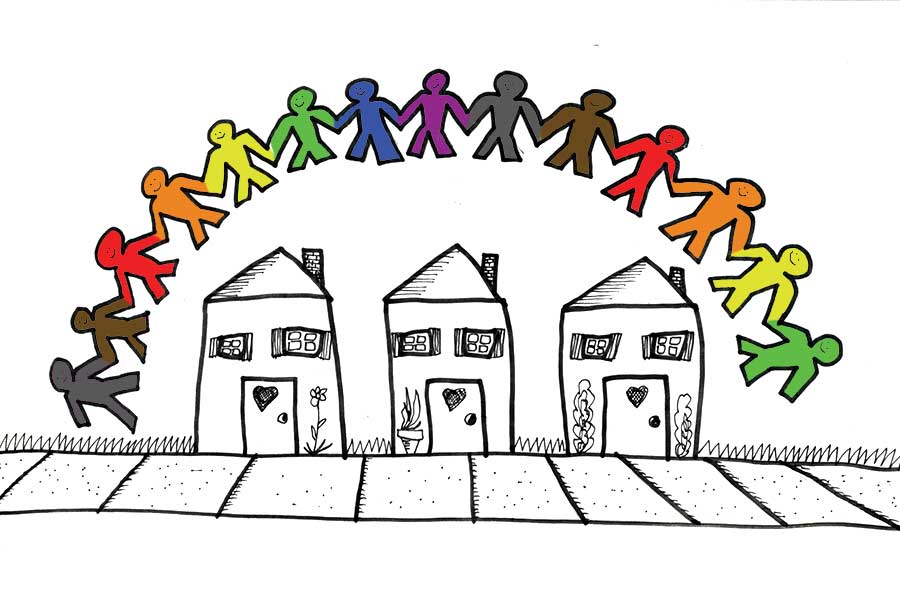
To increase access to housing services for patients of FIGHT’s Y-HEP Adolescent and Young Adult Health Center, the HIV-prevention group has teamed up with social services organization Valley Youth House.
The nonprofits kicked off a collaboration Sept. 9 that has two Valley Youth House staff members visiting the Y-HEP Health Center on Mondays from 2-5 p.m. to connect patients experiencing housing insecurity or homelessness with housing counseling, emergency housing referrals and resources including clothing, personal hygiene products and sleeping bags. The clinic serves patients ages 13-24. Those at least 18 years old can also work with staffers to complete the Office of Homeless Services’ coordinated entry housing assessment, a tool that matches eligible people with housing within 3-6 months, said Zakia Dodson, FIGHT’s community health worker.
The initiative at Y-HEP Health Center, at 1207 Chestnut St., intends to co-locate health and wellness services under one roof to decrease barriers to accessing housing support, said Cameron McConkey, FIGHT’s Stoneleigh Emerging Leader Fellow.
“It offers us an opportunity to have a system of coordinated care for youth and to offer services in parallel, as opposed to doing things one at a time, [which] can be really slow and bureaucratic,” he added.
Last year, the Y-HEP Health Center served about 800 youth, of which 10 percent received gender-affirming care, McConkey told PGN. Dodson works fulltime to help with legal name changes, as well as referrals, transportation and support for gender-affirming surgical appointments. The clinic’s registered nurse also provides education and teaching around hormones, injections and the process of transitioning.
The on-site collaboration stemmed from a “recognized need” for housing services among many patients, who disclosed their housing situation in response to social-determinant questions, or were found casually discussing their living situations in the waiting room or lingering at the clinic after an appointment, McConkey said. These folks can choose to meet with the Valley Youth House coordinators privately to hear about available options.
According to youth homelessness organization True Colors United, LGBTQ young people comprise 40 percent of youth experiencing homelessness in the United States, despite accounting for only 7 percent of the total youth population. A 2017 study by Chapin Hall of the University of Chicago found queer youth are 120 percent more likely to experience homelessness than their heterosexual peers.
Valley Youth House and Y-HEP Health Center staff have a long-standing partnership, but having Valley Youth House representatives on-site at the clinic allows the nonprofits to take their services a step further, said Alyssa Weinfurtner, street outreach and emergency services supervisor at Valley Youth House. About 2-5 youth per week have met with the staffers since the initiative’s launch.
Youth who aren’t patients at the clinic can also meet with Valley Youth House staff on Mondays.
The initiative exemplifies a shift in the medical world toward emphasizing “the whole person” and how stressors like experiencing homelessness impact someone’s health and wellbeing, Weinfurtner told PGN. Consolidating housing and medical services in one space can also reduce the stigma surrounding housing insecurity, she added.
“It can be something that brings a lot of shame and stress from folks that I think traditionally in a lot of service locations was not something that was openly talked about,” Weinfurtner said. “Providing that pathway for youth is helpful.”
The Y-HEP Health Center initiative is one of four “mobile sites” Valley Youth House debuted in Philadelphia this summer. Staff also visit the Mazzoni Center’s Adolescent Drop-In program each Wednesday from 5-7 p.m., North Philadelphia’s Achieving Independence Center on Thursdays from 3-5 p.m. and the Community College of Philadelphia every other Wednesday.
“I believe in a one-stop shop for folks to get all their needs met instead of running around to different appointments at different locations throughout the city, when a lot of folks are still, in that process, trying to secure housing for that night,” Weinfurtner said. “We’re trying to make it more convenient and make it more accessible.”
The Office of Homeless Services funded the mobile sites following the March 2018 launch of Valley Youth House’s “youth access point” at 1500 Sansom St., Weinfurtner added. Dodson accompanies Y-HEP Health Center patients here if they demonstrate a need for housing resources when Valley Youth House staff aren’t at the clinic.
Since January, 450 youth new to Valley Youth House have received services at the Center City access point, which provides assessments and housing referrals for young people experiencing homelessness.
The collaboration with Valley Youth House is part of a larger programming focus at Y-Hep Health Center to provide co-located, coordinated services to youth experiencing socioeconomic challenges, McConkey said. Staff from Pennsylvania CareerLink, a job-search program by the state Department of Labor & Industry, visit the clinic twice per month to educate on employment insecurity and offer support services. A BenePhilly counselor is also available fulltime on-site to aid patients in enrolling for health insurance, food stamps and other public assistance.
“The message that we ultimately hope to convey to the community and to youth is that we’re here to support them in whatever needs that they may have and to try to work with them to understand what priorities they have in regards to their health, their situation and their experience,” McConkey said.
